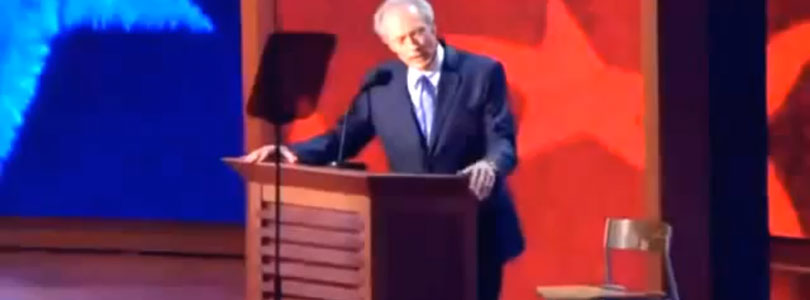The Brilliance of Clint’s Empty Chair
Politicos and policy wonks have been parsing every major speech offered at the Republican National Convention in Tampa, Florida, each with his or her own lens. (The exception is MSNBC, which apparently declined to parse several speeches by ethnic minorities.) Some have commented on the gender-war content of Ann Romney’s statements; some have focused on the deep policy weeds of Vice-Presidential Candidate Paul Ryan.
But the most transformative moment — in its way, the most redolent of the Tea Party revolution — was Clint Eastwood’s conversation with an empty chair in which President Obama was not sitting.
One of the clearest tidbits recalled from my playwright studies was a device that effectively made a murder victim present on the stage. On a set of his house, during an interview scene with family members, the script called for the actor playing a detective to lean his hand on the dead character’s favorite rocking chair and “inadvertently” set it in motion.
What Clint Eastwood emphasized, with his seemingly improvised chat with the invisible Obama was the absurd notion of having a man-to-man talk with the Vogue-interviewee president. Eastwood was a real celebrity expressing common-man ideas to a celebrity commander in chief.
Even more, Eastwood’s fame is founded in his being a character actor whose chief characteristic is to cut through nonsense. Tough and real; doing what needs to be done.
Viewers who found the speech peculiar (mainly those in academia, entertainment, and media, I’d wager) may have done so because Eastwood used a theatrical device in the service of the wrong script… from their point of view and according to their expectations. As a thought experiment, they should imagine some other actor’s using the exact same gimmick at the Democrat National Convention, with a non-present Mitt Romney.
To be sure, an invisible, unapproachable businessman would be much more to type than a “populist,” progressive community organizer, just as the Occupy movement is much more in keeping with the established images of grassroots activism than the Tea Party.
Beyond the screen writer’s flair, though, the feel of Clint Eastwood’s convention speech was not of soaring political rhetoric, but of a movie awards ceremony, as if he were speaking to an audience of peers. And there again is the unique character that he has been in the public imagination, as if we the people are his peers, not the glitzy stars. He introduced himself to the GOP audience as a “movie tradesman.”
What Eastwood did, with his extemporaneous air and unfilled chair, was to call bull**** on the increasingly untenable narrative that the Left has been weaving through all of the public institutions that it has spent decades infiltrating. He elevated to TV Land the shocking breach of story line and etiquette that hit YouTube years ago when angry citizens shouted down their Senators at town hall meetings.
The speech may not be a pivot point to a new reality in Hollywood, and the political side it serves may not win the day in November, but to the guardians of the elite, it was definitely a statement new, even though to the rest of us it was a very familiar sensation.


